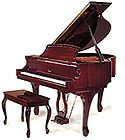
WHY LEARN THE PIANO ?
The physical, mental and spiritual benefits of playing the piano are well documented. What few people realise, however, is just how easy it can be to take the first step.
There is hardly any age that's wrong for taking up the piano. Once a child has expressed the desire to learn the piano, shows sufficient concentration to absorb ideas presented in the lesson, and understands the concept of practise, then he or she is ready. For some children this may be as young as six whilst others may not be ready until the age of nine or ten.
Developing minds can pick up new skills and patterns quickly, and the younger the pianist, the more years of enjoyment lie ahead.
But it's never too late, either. My oldest piano pupil didn't start until he was into his sixties.
What's really important is that a child, or adult, WANTS to learn. Every music teacher can tell you about pupils who start the piano because parents or grand-parents think they should. They are usually the ones that fail, because without the motivation to succeed there is not the willingness to sit down at the piano and do the necessary practise, and playing the piano becomes a chore, rather than the delight that it should be.
For those who do practise the joy of mastering a new piece of music is beyond measure. Self confidence grows, young people learn how to express themselves both musically and personally. They come to appreciate values other than material ones, and a more rounded individual is the end result. Recent research has even found that playing music establishes new neural channels in the brain that improve academic ability in other subjects.
Even so, for three hundred years the simple joy of making music has been all the reward a piano player ever needed.
(Sorry, I no longer take beginners)
The physical, mental and spiritual benefits of playing the piano are well documented. What few people realise, however, is just how easy it can be to take the first step.
There is hardly any age that's wrong for taking up the piano. Once a child has expressed the desire to learn the piano, shows sufficient concentration to absorb ideas presented in the lesson, and understands the concept of practise, then he or she is ready. For some children this may be as young as six whilst others may not be ready until the age of nine or ten.
Developing minds can pick up new skills and patterns quickly, and the younger the pianist, the more years of enjoyment lie ahead.
But it's never too late, either. My oldest piano pupil didn't start until he was into his sixties.
What's really important is that a child, or adult, WANTS to learn. Every music teacher can tell you about pupils who start the piano because parents or grand-parents think they should. They are usually the ones that fail, because without the motivation to succeed there is not the willingness to sit down at the piano and do the necessary practise, and playing the piano becomes a chore, rather than the delight that it should be.
For those who do practise the joy of mastering a new piece of music is beyond measure. Self confidence grows, young people learn how to express themselves both musically and personally. They come to appreciate values other than material ones, and a more rounded individual is the end result. Recent research has even found that playing music establishes new neural channels in the brain that improve academic ability in other subjects.
Even so, for three hundred years the simple joy of making music has been all the reward a piano player ever needed.
(Sorry, I no longer take beginners)
Chalford * Stroud * Cirencester * Gloucester * Cheltenham * Tetbury * Nailsworth * Painswick * Dursley


